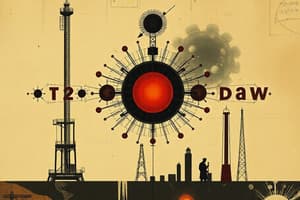Podcast
Questions and Answers
What happens to the volume of a gas when it is heated?
What happens to the volume of a gas when it is heated?
- It contracts
- It solidifies
- It evaporates
- It expands (correct)
Which theory describes the behavior of gas particles in terms of their motion?
Which theory describes the behavior of gas particles in terms of their motion?
- Electromagnetic Theory
- Gravitational Theory
- Quantum Mechanics Theory
- Kinetic Molecular Theory (correct)
What happens to the density of a gas when pressure increases?
What happens to the density of a gas when pressure increases?
- Density decreases
- Density increases (correct)
- Density changes to a solid state
- Density remains constant
According to the Kinetic Molecular Theory, what would happen to gas particles if their motion were stopped?
According to the Kinetic Molecular Theory, what would happen to gas particles if their motion were stopped?
Which principle governs the relationship between the pressure, volume, and temperature of gases?
Which principle governs the relationship between the pressure, volume, and temperature of gases?
What characteristic of gases allows them to mix with other gases easily?
What characteristic of gases allows them to mix with other gases easily?
According to the Kinetic Molecular Theory, gas particles...
According to the Kinetic Molecular Theory, gas particles...
Which gas law focuses on the relationship between the pressure and volume of a gas?
Which gas law focuses on the relationship between the pressure and volume of a gas?
What is the main variable in the Ideal Gas Law?
What is the main variable in the Ideal Gas Law?
How does an increase in temperature affect the pressure of a gas according to the Kinetic Molecular Theory?
How does an increase in temperature affect the pressure of a gas according to the Kinetic Molecular Theory?
Which law describes the relationship between the volume and temperature of a gas at constant pressure?
Which law describes the relationship between the volume and temperature of a gas at constant pressure?
What does the Ideal Gas Law help scientists do?
What does the Ideal Gas Law help scientists do?
Flashcards are hidden until you start studying
Study Notes
Gases: An Overview
Gases are all around us, from the oxygen we breathe in the air to the helium in party balloons. They have distinct properties that set them apart from other types of matter. In this article, we'll explore the nature of gases, how their molecules behave, and some fundamental principles that govern their behavior, such as the Kinetic Molecular Theory and the Ideal Gas Law.
Properties of Gases
A gas is characterized by its expansion to occupy the entire volume available to it, its diffusion into small spaces, and its tendency to mix with other gases. It expands when heated and contracts when cooled, and its density depends upon pressure and temperature. These properties can be understood through the Kinetic Molecular Theory, which describes the behavior of atoms and molecules in terms of their motion.
Behavior of Gas Particles
The Kinetic Molecular Theory posits that gas particles are in constant motion, moving at high speeds and colliding frequently with one another and the walls of their container. This motion gives rise to the observed properties of gases, particularly their expansiveness and ability to fill any space they're confined within. According to the theory, if you were able to slow down or stop the motions of these gas particles, they would transition into either a liquid or a solid state.
Kinetic Molecular Theory
This theory, developed in the late 19th century by James Clerk Maxwell, Ludwig Boltzmann, and others, provides a framework for understanding the behavior of gases. It states that gas particles are in constant motion, moving randomly in all directions and undergoing frequent collisions with one another and the walls of their container. As a result, gases tend to expand to fill any space available, and their pressure increases as their temperature rises due to more energetic particle collisions.
Gas Laws
Several laws describe the relationships between the properties of gases and how they affect each other. Among these are Boyle's Law, Charles' Law, Gay-Lussac's Law, Avogadro's Law, and Dalton's Law, collectively known as the Ideal Gas Laws. Each of these laws focuses on different aspects of gases, such as pressure, temperature, volume, amount of substance, mixture, and behavior under varying conditions. Together, these laws help scientists predict changes in gas properties based on changes in external factors like pressure and temperature.
Ideal Gas Law
The most important of these gas laws is the Ideal Gas Law, which relates the quantities of four variables: the number of moles (n), the volume occupied by the gas sample (V), the absolute temperature (T) (in Kelvin), and the internal pressure (p). The equation is written as:
[ pV = nkT ]
where (k) is a constant called the gas constant, which is specific to each type of gas. This relationship allows chemists and physicists to calculate the value of one variable given values for the other three, thus serving as a crucial tool in many scientific fields that involve gases, including meteorology, climatology, and atmospheric chemistry.
In summary, gases exhibit unique characteristics due to the behavior of their constituent particles. Understanding their properties and behavior requires knowledge of both macroscopic observations and microscopic explanations, provided by theoretical models such as the Kinetic Molecular Theory and the various gas laws.
Studying That Suits You
Use AI to generate personalized quizzes and flashcards to suit your learning preferences.




